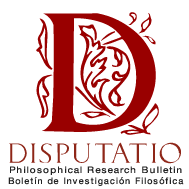Jorge Roaro
Universidad de Salamanca, España | jorgeroaro@usal.es
Recibido: 25–Septiembre–2017 | Aceptado: 20–Diciembre–2017 | Publicado: 22-Diciembre-2017
Texto Completo | Nota de Copyright | Índice Vol. 6 No. 7
Cómo citar este artículo:
Roaro, Jorge. «Elogio del politeísmo, en la visión de Odo Marquard». Disputatio. Philosophical Research Bulletin 6, nº 7 (2017): pp. 581-592.
Resumen | En esta exposición del argumento central del ensayo Sobre Monomiticidad y Polimiticidad, de Odo Marquard, aparecen varias nociones clave en la visión humanista del filósofo alemán: a) la valoración del poder del lenguaje, y particularmente del lenguaje narrativo, para perfilar nuestro entendimiento del mundo y nuestro propio sentido de identidad, en una forma inalcanzable desde la simple exposición teórica; b) la confirmación de la multiplicidad de lenguajes, de discursos, de modos de vida, de valores, y por lo tanto, de diferentes narrativas, para dar cuenta del conjunto inabarcable de la experiencia humana, imposible de reducir a un solo dogma o teoría, pretendidamente «universal»; c) la desconfianza, por lo tanto, respecto a cualquier dogma, ya sea religioso o teórico, que pretenda poder alcanzar una verdad definitiva sobre el mundo y sobre nuestra experiencia vital; d) el elogio de la diversidad de ideas y puntos de vista, única garantía posible de la verdadera libertad del hombre.
Palabras Clave | Mito · Razón · Progreso · Monoteísmo · Politeísmo · Positivismo · Lenguaje.
![]()
Praise of Polytheism, in the vision of Odo Marquard
Abstract | In this exposition of the central argument of the essay On Monomiticity and Polimiticity, by Odo Marquard, several key notions in the humanist vision of the German philosopher appear: a) the assessment of the power of language, and particularly narrative language, to shape our understanding of the world and our own sense of identity, in a form unattainable from the simple theoretical exposition; b) the confirmation of the multiplicity of languages, of discourses, of ways of life, of values, and therefore of different narratives, to account for the boundless set of human experience, impossible to reduce to a single dogma or theory, allegedly «universal»; c) distrust, therefore, regarding any dogma, whether religious or theoretical, that pretends to be able to reach a definitive truth about the world and about our life experience; d) the praise of the diversity of ideas and points of view, the only possible guarantee of the true freedom of man.
Keywords | Myth · Reason · Progress · Monotheism · Polytheism · Positivism · Language.
Referencias
Barthes, Roland (1964/2003). Mythen des Alltags. Fráncfort del Meno: Suhrkamp.
Marquard, Odo (1995/2000). Adiós a los principios. Traducción de Enrique Ocaña. Valencia: Institució Alfons el Magnánim.
Información Adicional
Disputatio [Diciembre 2017], Volumen 6, Número 7, pp. 581-592
Artículo | [esp] | Estadísticas | BIBLID [2254-0601(2017)6:7; pp.581-592]
DOI: 10.5281/zenodo.2512312
© El autor(es) 2017. Publicado por Disputatio bajo una licencia Creative Commons, por tanto Vd. puede copiar, distribuir y comunicar públicamente este artículo. No obstante, debe tener en cuenta lo prescrito en la nota de copyright. Permisos, preguntas, sugerencias y comentarios, dirigirse a este correo electrónico: boletin@disputatio.eu o rellenar este formulario.
